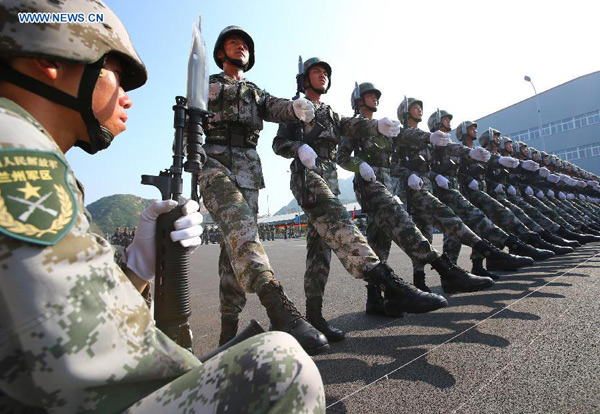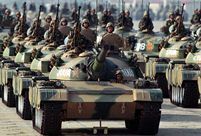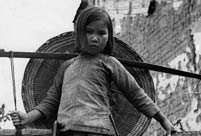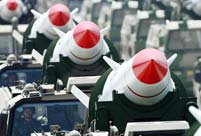

 |
| Photo taken on July 28, 2015 shows soldiers participating in training for the Sept. 3 military parade at the parade training base. Chinese soldiers and military officers have been sweating over the upcoming high-profile parade in commemoration of the 70th anniversary of the end of World War II for the last three months as they prepare for the show on Sept. 3. (Xinhua/Zha Chunming) |
Republic of Korea President Park Geun-hye will pay a three-day visit to China from Sept 2 to attend the celebrations in Beijing to mark the 70th anniversary of the end of World War II. On Sept 4, she is scheduled to visit Shanghai to re-open the office of the Provisional Government of the Republic of Korea, which was set up by some Korean independence fighters in 1919, nine years after Japan occupied the Korean Peninsula.
But the commemorative activities in China, along with the Victory Day parade in Moscow about three months ago, have been used to speculate that China and Russia are forging an "anti-West alliance". Skeptics even cite the ongoing China-Russia naval drills in the Peter the Great Gulf and other areas off the Russian coast as "solid evidence" of the building up of such an alliance.
Worse, a recent editorial in the London-based Economist magazine said China's Sept 3 parade "is not just about remembrance"; it will "unsettle" its neighbors, as the country "plays up themes of historical victimhood and the need to correct" them.
The truth is, China's contribution to the victory in the anti-fascist war has been underestimated both at home and abroad. The Chinese People's War of Resistance Against Japanese Aggression (1937-45) actually started with the Sept 18th Incident in 1931 and lasted almost 14 years - the first and the longest fight against fascist forces.
The sacrifices of the Chinese people (35 million casualties) during that bloody period, too, deserve full acknowledgement. China lost more people, both soldiers and civilians, than any other country, except perhaps for the Soviet Union (at least 27 million), in the anti-fascist war. The Chinese people engaged a huge number of Japanese troops in battles in China, where nearly 70 percent of Japanese troops were injured or killed.
Before Japan launched a surprise attack on Pearl Harbor in 1941, which dragged the US into WWII, Chinese people alone took on 94 percent of the Japanese forces deployed overseas in 1938 and 78 percent in 1940. More than 45 million Chinese people participated in the enduring resistance, which involved a total of about 1.7 billion people from 61 countries.
Thanks to the Chinese people, the Japanese troops were not able to proceed further to attack the eastern part of the Soviet Union, or make inroads into India, Australia and perhaps the Middle East, as the then US president Franklin D. Roosevelt feared in a worst scenario. On the other hand, Japan's failure to colonize China boosted the morale of anti-fascist fighters across the globe, and united them into a massive force.
Therefore, China has every reason to celebrate the hard-won victory against fascism. Western leaders used Russia's involvement in the Ukraine crisis as an excuse to boycott Moscow's Victory Day parade in May. Now, they refuse to attend Beijing's commemorative events, too, which is unacceptable. By holding a military parade on a day other than the National Day, China, as a rising power, aims to send a message that it is ready to relinquish its "victimhood". Apart from reminding postwar generations in China and Japan of the hard-fought peace and the importance of maintaining it, the commemorative events in Beijing are expected to show China's resolve to safeguard the postwar world order and regional stability, instead of undermining them.
In his recent book, Forgotten Ally: China's World War II, 1937-1945, Rana Mitter, professor of history at Oxford University, says China's role has been overlooked in Western narratives and calls for its fairer evaluation to help people heed the lessons of history and "avoid repeating the same mistakes".
This is exactly why Beijing and Seoul seek a sincere apology from Japanese leaders. The dangerous right-leaning tendency of Japanese Prime Minister Shinzo Abe, reflected in the passage of two new security bills, has left a ticking time bomb in East Asia. There is no reason to politicize the commemorative events in Beijing, because that would send out the wrong signal that the West does not welcome the rise of China and does not want Japan to express remorse for its past and learn the lessons of history.
 In pics: album of PLA grand military parades
In pics: album of PLA grand military parades Chinese tanks in National Day Parade
Chinese tanks in National Day Parade In pics: shocking aftermath of Tianjin blasts
In pics: shocking aftermath of Tianjin blasts
 Indomitable Chinese people during WWII
Indomitable Chinese people during WWII
 Awesome Chinese missiles
Awesome Chinese missiles Amazing photos of Chinese Air Force in parade
Amazing photos of Chinese Air Force in parade Striking moments when strategic missiles are launched
Striking moments when strategic missiles are launched Shocking scenes found in 4000-year-old earthquake relic
Shocking scenes found in 4000-year-old earthquake relic Stunning moments of Chinese fighter jets
Stunning moments of Chinese fighter jets China’s ethnic minority games
China’s ethnic minority games SDR extension may prompt more opening
SDR extension may prompt more opening Feng shui foundations
Feng shui foundations President Park’s China trip a logical choice
President Park’s China trip a logical choiceDay|Week